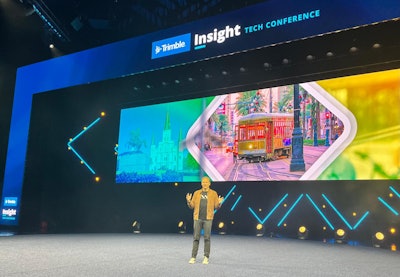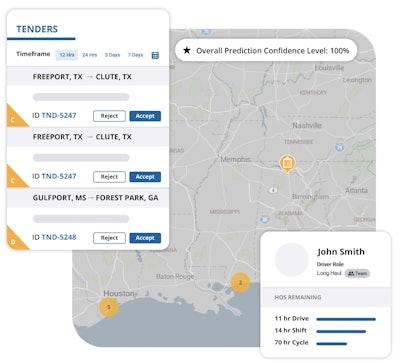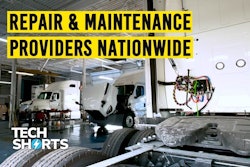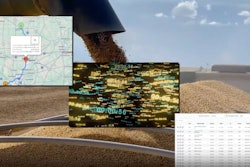
Small gains beat quick wins when they compound over time. This was the core message from Trimble CEO Rob Painter as the company opened its 2025 Insight user conference Monday in New Orleans.
The global technology provider for fleets, freight brokerages, and third-party logistics providers unveiled a suite of AI-powered products and integrations at the event.
The company is betting that AI will be a “force multiplier” that transforms complex business data into actionable insights, and that small efficiencies will compound into major savings.
Painter emphasized the significance of connecting data, people, and workflows through a “connected transportation ecosystem” by unifying data from shippers, carriers, brokers, and 3PLs under one platform.
[RELATED: First steps into AI: practical use cases for fleets]
Trimble’s new TMS
The company unveiled several new solutions within its platform, and each feature is housed in Trimble’s next-generation, AI-powered Trimble Transportation Management System (TMS).
Designed to be a “single, intelligent center of our connected transportation ecosystem,” Michael Kornhauser, senior vice president of transportation and logistics, said, “Trimble TMS is not just an upgrade. What makes it unique is that it was built for the complex operations of enterprise transportation companies.”

The platform integrates seamlessly with Trimble’s current TMS infrastructure and uses AI and machine learning to streamline workflows and deliver predictive insights.
However, Trimble doesn’t plan to develop every capability in-house, with Kornhauser adding, “We’re not focused on being everything for everyone.” Instead, the new TMS will function as a wider ecosystem supported by partnerships and other providers that “round out the solution.”
The new TMS isn’t customizable, Kornhauser pointed out, but deliberately configurable, depending on various business needs. Customers can use the new Trimble TMS as a modular solution, integrating incrementally with one of Trimble’s existing solutions, or as an end-to-end solution. The system features seven modules, each embedded with AI agents to manage the entire operations cycle, from order acceptance through AI-assisted load building and optimization, and fleet preparation that intelligently matches shipments with the best drivers, to shipment tracking and visibility. Back-office operations also gain from centralized reporting for administrative, financial, and analytical functions.
Trimble’s new AI agents automate administrative workflows
Trimble also released a set of AI agents to automate time-consuming manual tasks.
 Michael Kornhauser, senior vice president of transportation and logistics, Trimble, said the AI solutions aren't meant to replace people, but boost their productivity.
Michael Kornhauser, senior vice president of transportation and logistics, Trimble, said the AI solutions aren't meant to replace people, but boost their productivity.
- Order Intake Agent extracts information from emails, PDFs, or EDIs, then automatically populates the TMS with order details. Kornhauser noted that Trimble’s testing showed that the agent removed the need for manual review in up to 90% of standard orders.
- Invoice Scanning Agent reads repair invoices in PDF format and puts the data directly into Trimble’s TMT Fleet Maintenance. Early adopter Knight-Swift reclaimed 40 to 50 hours weekly, Kornhauser said, essentially saving an employee’s time and energy.
- Road Call Agent is an AI-powered 24/7 service that listens to drivers describe breakdown issues, collects data, automatically creates a ticket, and routes them to maintenance teams.
Kornhauser emphasized that the new AI solutions aren’t meant to replace people, but to free their time and resources to do higher priority tasks. “We’re developing AI that helps your business accelerate. It’s here to give them powerful new assistance, and it’s here to help them radically amplify your productivity.”
[RELATED: Applications of AI in the trucking industry]
New ecosystem integrations
The company rolled out new integrations to tackle industry issues such as driver retention, procurement, and digital transportation, unifying data and eliminating operational delays.
Trimble’s all-new Fleet Hub now offers cloud-based driver communication while linking the TMS to major telematics platforms including Platform Science, Samsara, ISAAC, Geotab, and Solera. It also connects with Trimble Smart Workflow.
Trimble Freight Marketplace is now enhanced with AI-powered carrier vetting alongside direct shipper freight access. The platform aims to address procurement fragmentation by streamlining carrier selection and improving capacity matching. Shippers like Procter & Gamble has already moved shipments through the marketplace.
A new integration between Tandem Concepts and Trimble Fuel Dispatch TMS aims to solve a persistent challenge in fuel hauling: the costly “no load” scenario where drivers are dispatched at the fuel rack but find allocation or credit issues. The new integration digitally validates before dispatch, helping prevent wasted trips.
Trimble plans to roll out the beta for its end-to-end Trimble TMS solution in Q1 2026, along with other new AI agents and integrations. Trimble Fleet Hub is already in Trimble TMW.Suite, while the integration between Tandem Concepts and Trimble Fuel Dispatch TMS is currently in beta.











